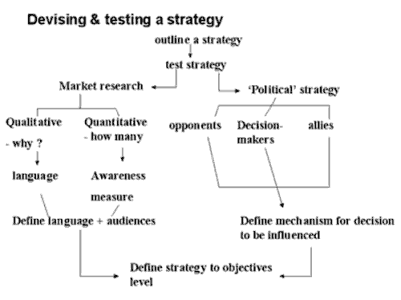Campaigning
A new section looking at how to campaign. The Networking Newsletter welcomes contributions discussing the pros and cons of different approaches to campaigning. In future issues we will discuss campaign tactics, methods and resources, giving pointers to online and other resources.
How to Fail
Researcher Avner de-Shalt has recently looked at campaigning experiences in England and the USA, and deduced from them the 10 command-ments of "how to fail an environmental campaign". Whilst successful campaigns, he points out, are often claimed by many groups to be their triumphs, "failures remain orphans". His aim was to "analyse these failures without disheartening anybody". So here goes, ten things you really should avoid
- Always struggle for total change: never accept reform or compromise
- Always use the terminology of despair
- Always use biocentric arguments
- Don't initiate just react
- Always declare that you are not doing anything political
- Emphasis legislation - not politics
- Do your very best to attract media attention
- Promote the organisation itself
- Never be benevolent to other organisations
- Do not trust this research: it is the advice of "softie"
So there you go. In typically, self-depreciating style, the advice of a softy environmental researcher. Make of it what you will. The whole article can be found in the Spring 2001 edition of the journal Environmental Politics.
Graeme Sherriff ([email protected])
How Not to Fail
 Chris Role, who has been Deputy Executive and Programme Director of Greenpeace UK and Strategic Adviser to Greenpeace International, Director of Media Natura, and a wildlife campaigner for Friends of the Earth, has put together a website on campaigning strategy. http://www.campaignstrategy.org gives "modest suggestions for anyone trying to save the world" and has several interesting sections including "A Reality Check" (do you need to campaign, we know it can be fun but would another method be more effective?), "Basic Guidelines", "Advanced Tips" for trouble-shooting your campaign and "Resources: Handy links & Other Stuff".
The basic guidelines could be summarized as:
Chris Role, who has been Deputy Executive and Programme Director of Greenpeace UK and Strategic Adviser to Greenpeace International, Director of Media Natura, and a wildlife campaigner for Friends of the Earth, has put together a website on campaigning strategy. http://www.campaignstrategy.org gives "modest suggestions for anyone trying to save the world" and has several interesting sections including "A Reality Check" (do you need to campaign, we know it can be fun but would another method be more effective?), "Basic Guidelines", "Advanced Tips" for trouble-shooting your campaign and "Resources: Handy links & Other Stuff".
The basic guidelines could be summarized as:
- Motivation not education - you need to motive your audience not educate it
-
 Analyze the foces involved - why hasn't what you want already happened? Identify the forces for and against it, which will give you your allies and opponents. How can you change the balance of forces in your favour?
Analyze the foces involved - why hasn't what you want already happened? Identify the forces for and against it, which will give you your allies and opponents. How can you change the balance of forces in your favour?
- KISS - "keep it simple stupid". To effectively motivate people your message needs to be simple and in the right order. Have an umambiguous strapline, one that needs no explanation (and it may even be free publicity when a reporter says "and here's Jo from 'Stop Runway 3'..."). And say what you mean - don't be clever, just say what you mean.
- Be orderly - via a series of events introduce the problem, the "enemy" and the solution. A campaign should unfold like a novel - exciting and involving. You're not out to educate the public but to get them involved such that the solution becomes attainable. And start from where your audience is - what interests them (not you!)?
- Stepping stones to success - plan a campaign as a series of steps, only move on when you've fully succeeded at the current step. Only communicate your current campaign step and not the "whole picture" such as Greenpeace's success with Brent Spar (one campaign step) as part of the "whole picture" of ocean pollution.
Make things happen - events create more coverage than arguments. What's the "verb" in your campaign? The media likes to cover "forces in opposition" - planting flowers is not as news-worthy as being stopped by the establishment from planting flowers. Ensure every campaign step has a picture, for use by the media or for publicity: every picture is worth a 1000 newspaper column inches.
- Don't preach - campaigning is having a conversation with society, it's two ways and you must listen as much as speak. Does your campaign communicate with your supporters? How about your target audience? Media coverage means nothing if the audience isn't communicating with you.
 Home
Home
STOP PRESS
Latest newsletter
Events listing
Campaign contacts
Resources
Network for Success
Subscribe now!
Search this site
© Networking Newsletter (Oct/Nov 2002)
 Analyze the foces involved - why hasn't what you want already happened? Identify the forces for and against it, which will give you your allies and opponents. How can you change the balance of forces in your favour?
Analyze the foces involved - why hasn't what you want already happened? Identify the forces for and against it, which will give you your allies and opponents. How can you change the balance of forces in your favour? Chris Role, who has been Deputy Executive and Programme Director of Greenpeace UK and Strategic Adviser to Greenpeace International, Director of Media Natura, and a wildlife campaigner for Friends of the Earth, has put together a website on campaigning strategy. http://www.campaignstrategy.org gives "modest suggestions for anyone trying to save the world" and has several interesting sections including "A Reality Check" (do you need to campaign, we know it can be fun but would another method be more effective?), "Basic Guidelines", "Advanced Tips" for trouble-shooting your campaign and "Resources: Handy links & Other Stuff".
The basic guidelines could be summarized as:
Chris Role, who has been Deputy Executive and Programme Director of Greenpeace UK and Strategic Adviser to Greenpeace International, Director of Media Natura, and a wildlife campaigner for Friends of the Earth, has put together a website on campaigning strategy. http://www.campaignstrategy.org gives "modest suggestions for anyone trying to save the world" and has several interesting sections including "A Reality Check" (do you need to campaign, we know it can be fun but would another method be more effective?), "Basic Guidelines", "Advanced Tips" for trouble-shooting your campaign and "Resources: Handy links & Other Stuff".
The basic guidelines could be summarized as: Analyze the foces involved - why hasn't what you want already happened? Identify the forces for and against it, which will give you your allies and opponents. How can you change the balance of forces in your favour?
Analyze the foces involved - why hasn't what you want already happened? Identify the forces for and against it, which will give you your allies and opponents. How can you change the balance of forces in your favour? Home
Home